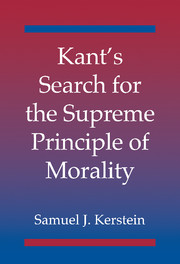Book contents
- Frontmatter
- Contents
- Acknowledgments
- Key to Abbreviations and Translations
- Introduction: Derivation, Deduction, and the Supreme Principle of Morality
- 1 Fundamental Concepts in Kant's Theory of Agency
- 2 Transcendental Freedom and the Derivation of the Formula of Universal Law
- 3 The Derivation of the Formula of Humanity
- 4 The Derivation of the Formula of Universal Law: A Criterial Reading
- 5 Criteria for the Supreme Principle of Morality
- 6 Duty and Moral Worth
- 7 Eliminating Rivals to the Categorical Imperative
- 8 Conclusion: Kant's Candidates for the Supreme Principle of Morality
- Notes
- Index
8 - Conclusion: Kant's Candidates for the Supreme Principle of Morality
Published online by Cambridge University Press: 06 September 2009
- Frontmatter
- Contents
- Acknowledgments
- Key to Abbreviations and Translations
- Introduction: Derivation, Deduction, and the Supreme Principle of Morality
- 1 Fundamental Concepts in Kant's Theory of Agency
- 2 Transcendental Freedom and the Derivation of the Formula of Universal Law
- 3 The Derivation of the Formula of Humanity
- 4 The Derivation of the Formula of Universal Law: A Criterial Reading
- 5 Criteria for the Supreme Principle of Morality
- 6 Duty and Moral Worth
- 7 Eliminating Rivals to the Categorical Imperative
- 8 Conclusion: Kant's Candidates for the Supreme Principle of Morality
- Notes
- Index
Summary
Kant's Candidates and Criteria for the Supreme Principle of Morality
Kant's derivation as I have interpreted it is in the first instance a derivation of the Formula of Universal Law. Yet it is open to Kant to offer a derivation of the Formula of Humanity using the same basic steps. After all, the rivals to the latter formula (e.g., utilitarian principles) are also rivals to the former. If, based on an appeal to criteria he develops for the supreme principle, Kant succeeds in disqualifying the rivals we discussed in Chapter 7 to the Formula of Universal Law, then, in effect, he also succeeds in eliminating rivals to the Formula of Humanity.
Now an opponent might grant that Kant, through appeals to his criteria, eliminates many rivals to his candidates for the supreme principle of morality. But, the opponent might claim, this is a Pyrrhic victory; appeals to Kant's criteria would also dispose of Kant's own formulas. Does Kant have the resources to rebut this claim? Does each of his formulas remain a viable candidate for the supreme principle of morality? This is the question that this chapter addresses, although it does not attempt to answer it thoroughly.
At the outset, it is once again helpful to have in view the criteria Kant embraces for the supreme principle of morality. There are eight main ones; four Kant incorporates into his basic concept of the supreme principle, the other four he develops through analysis of ordinary moral thinking.
- Type
- Chapter
- Information
- Kant's Search for the Supreme Principle of Morality , pp. 160 - 192Publisher: Cambridge University PressPrint publication year: 2002



